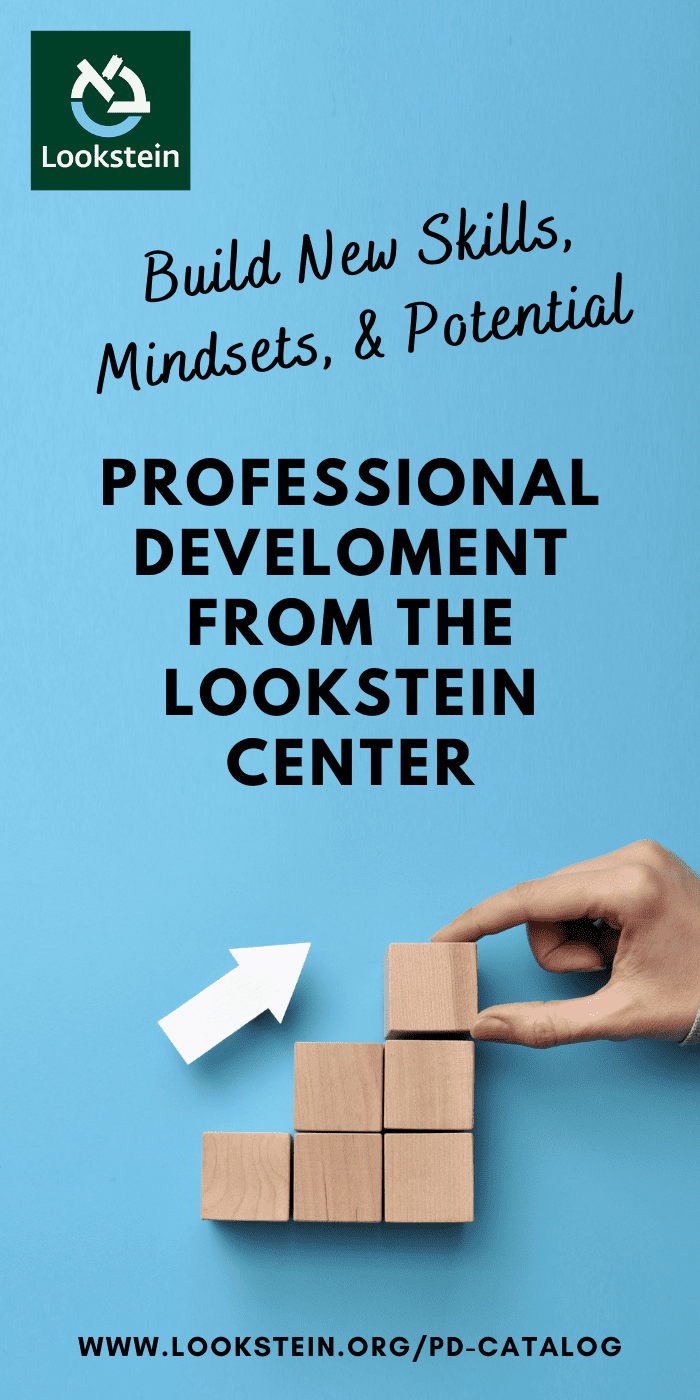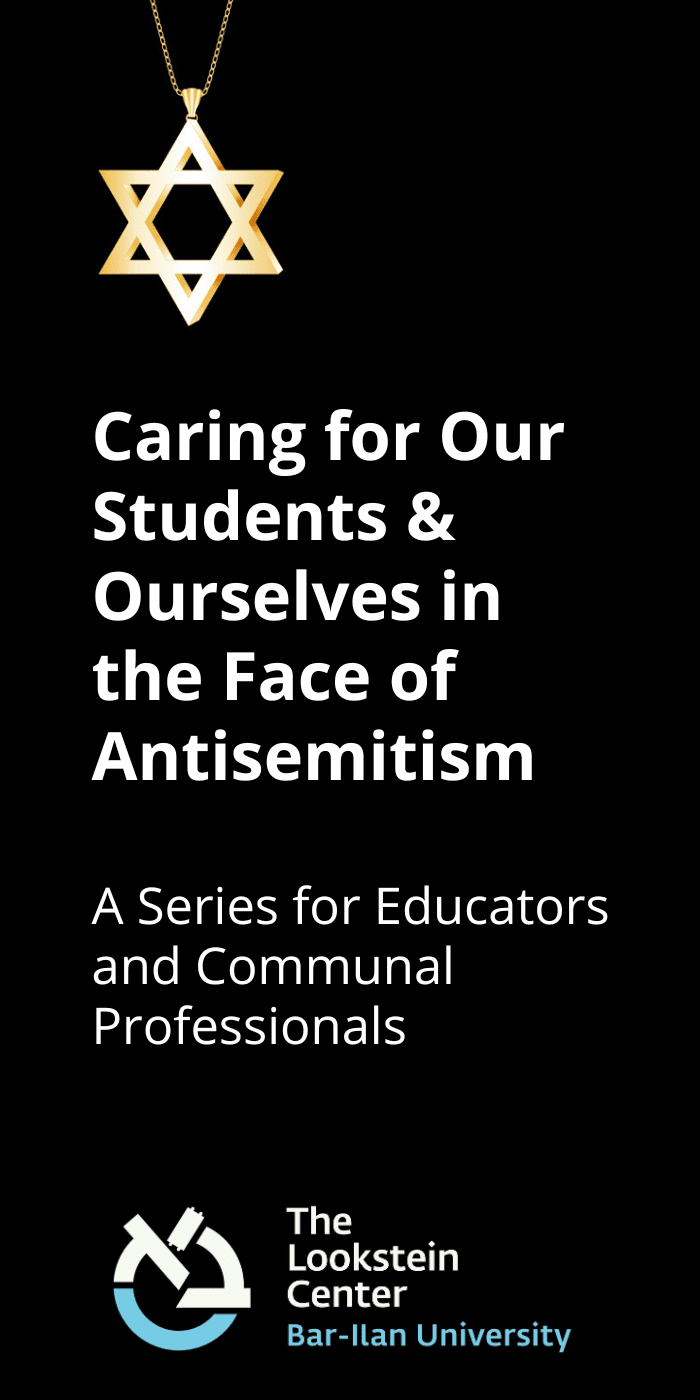A Seat at The Lookstein Center’s Conference Table – Parent Involvement
For as long as we can remember, parent involvement in schools was usually limited to volunteerism for a variety of school functions, often related to non-educational areas such as recruitment, fundraising, gifts for teachers, and chaperoning trips. A few select parents served advisory roles on a school’s educational committee and others on the school’s board of directors, but parents were largely kept out of roles involving education. That was comfortable for the vast majority of parents and the overwhelming majority of the educational staff. Schools were silos protected from meddling, and the classrooms were silos within those silos.
COVID-19 forced changes for many, as the homes became the locus of education. Teachers got new insights into students’ homes, and parents got to see and hear a lot of what was happening in the children’s virtual classrooms. The forced changes present an opportunity to rethink norms that likely evolved by default rather than by design. What kind of involvement do parents want to have? What could be the benefits and the downsides of that? What kind of involvement do the professionals believe could be productive and healthy?
While sitting around our own virtual conference table brainstorming the questions that would make up the Call for Papers for this issue, we shared our own ideas with one another and now we’d like to share them with you, our readers, as well. Pull up a chair.
I think about this question both on a macro scale and on a micro scale. On the macro scale, the last century has ushered in an era of professionalism in all fields – from banking to law to medicine, and even in education. That professionalization has been accompanied by specialization, even hyper-specialization. In medicine we are hard-pressed to find a General Practitioner, but it would not take long to find an expert on thyroid functioning or separating twins in utero. This professionalism and specialization, along with other societal changes, has often meant families with two working parents spending many hours out of the house, the result being that schools have had to take on many parenting roles from after-school care to counseling and a range of other support services which might have earlier been taken on by involved parents. COVID-19 has shifted the working world, so that parents are home more and taking on more active roles in their children’s lives, resetting the balance between home and school. This is to be welcomed, but poses a challenge to the educators who are much more professional than they were just a generation ago and who take greater ownership over their own work. This need not set up a conflict, and can be a boon for the teachers who can now count on the parents for more but who must also yield some of their control in the process.
On the micro scale, I think about individual teachers in their classes. With a highly professionalized parent body with a range of knowledge and skills, and who now may be working more flexible hours from home, they can play an amazing role in their children’s education in school, and not just as home-based support staff. Parents who are doctors or scientists can give guest classes in science classes, lawyers and social workers can offer insights in social studies or government, and so on. I’m not talking about “show and tell,” but about real parent integration on a regular basis. The parents and the schools can become real partners in education and the parents can become fully integrated. Aside from the obvious benefits, it would allow the parents to see their children in a different light and make the school functioning more transparent to the parents, which builds trust and confidence and offers opportunities for even greater professionalism in the school which embraces, rather than fears, parental involvement.
In thinking about the parent-school relationship, my initial reaction is as a parent experiencing COVID-19 distance learning. Much of this experience has been clouded by a sense of controlled chaos, but despite the chaos, the educational professional in me couldn’t help but see the amazing opportunity that had been presented to our children: the chance to become independent learners; the safe space in which to practice real life skills with the help of teachers and parents cheering them on. A small voice in the back of my head was even excited about this crazy, unchartered experience where my children would become master online learners by taking charge of their own time management, using effective online communication skills, and of course troubleshooting their own technology hiccups!
While this excitement might have been just a little bit exaggerated, seven months later I still believe that parents and teachers do have an amazing opportunity to work together to help our children develop their online learning skills. This shouldn’t take the form of parents spending hours on homework with their children each night, or serving as on-site tech support, but rather that teachers and parents form a united front in encouraging and reinforcing specific, age appropriate, transferable skills.
This type of ‘asynchronous’ partnership could serve as a model even when schools return to a brick and mortar setting. Focusing on skill development rather than content completion creates a common language and a framework through which parents and teachers can together encourage their students to face obstacles, and use their own resources to overcome those obstacles, be it academic or otherwise. Imagine the impact on our students if the same critical thinking, learning, communication, collaboration, and other skills were reinforced in both school and the home! By focusing on specific skills, parents and teachers could see each other as partners in their students’ development, and complement each other’s efforts for our students’ benefit.
Parents are the experts when it comes to their children – they see them in so many different contexts and know their kids “from the inside out.” But that doesn’t make them experts as educators; that’s what the teachers and school personnel are for. Teachers often make the mistake of thinking that school is the sole place where learning happens. Of course, school is where students expand their knowledge and are exposed to new ideas. In the best circumstances, school is where students feel safe enough to consider new ideas and how they might apply to their lives. But home is where a lot of the learning happens and is probably the most significant factor in determining a student’s outcome.
Parents and teachers are two halves of an educational puzzle. Engaging parents in a meaningful way in the education of their children shouldn’t be simply a check box on a checklist of best practices; without the involvement of parents the puzzle is incomplete. Parent partnership should be part of a school’s mission. What would this look like practically? Give teachers the space and time to explore how that partnership will look in their classrooms. This will take a serious mind shift and won’t be easy for teachers. The school will need to help them work this through, both individually and as a group, so that they don’t feel that the parents are being “thrust upon them” and so that they can figure out how to make the parents their partners. This takes us way beyond back-to-school nights, report cards, and the uncomfortable calls home when there’s a problem.
Communication should be two-way, frequent, timely, and open. Both teachers and parents need to learn to listen to each other, and not just to talk at each other. Just imagine the impact on students when they sense that their parents and teachers function as a team.
Parents are often very involved in the first half of first grade, listening to their children read, helping them with early math, signing off on worksheets to demonstrate to teachers that they are aware of progress. After school, for a few minutes every day, parents are coaches, gently correcting their children when they make an error, encouraging them not to give up, and cheering them on when they grasp a new idea or master a new skill. In these few months, children make great strides, and it is no coincidence that those strides are made when teachers and parents are working in tandem on common goals. Then, when the children have reached these goals, parents step back and give teachers space.
What if Jewish schools enlisted their long-term help in achieving well-articulated, specific goals? What if the daily investment of ten minutes extended through the first three or four years of school? What if it lasted longer? Research demonstrates that children can duplicate the achievements of those first few months of first grade if parents continue to act as coaches throughout their elementary school years.
Imagine the impact on Hebrew fluency if reading was conducted every evening for several years. Imagine the impact if the Parasha was reviewed throughout the week, again for several years? Not only would skill-building and knowledge-growth increase exponentially, but parents and children would have ongoing, shared Jewish learning experiences.



